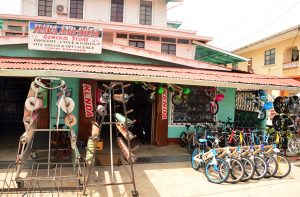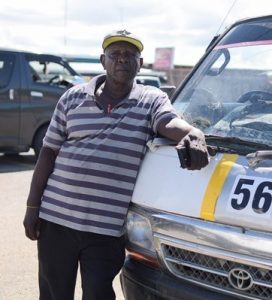…Berbicians baulk at proposed tolls hike
–say better buying a boat, urge good sense be made to prevail
“I AM better off buying a boat than paying that toll increase,” Julian Edwards, a resident of New Amsterdam, remarked after being asked how the proposed increase tolls to cross the Berbice Bridge will affect his livelihood.
The Berbice Bridge Company has proposed a more than 400 per cent increase, which is expected to take effect from November 12. The increase will see minibuses and cars traversing the bridge paying $8,040 instead of the $2,200 previously paid. Based on his analysis, he said on an annual basis it’s over $1M in toll a person will be paying the BBCI, since many Berbicians drive across the bridge on a regular basis.

“This will affect me, firstly my child is attending President’s College, and automatically buses will raise their fares; this will be hard on me, now I have to find money when I also cross the bridge, because I am also a student studying. Sometimes for the week I have to cross the bridge three times, now where will I find this money from to pay, since all aspects of cost of living will skyrocket with this bridge increase,” Edwards said.
He also noted that many persons will opt to use the river, since that would be a more feasible mode of transport and government will be forced to provide shuttle services. Taxi driver Kevin Hussein, said this will hit an already overtaxed population with the working class facing the full brunt of the increase in tolls.
“Many people salaries small and taxi drivers will have to increase their fares; passengers will feel the pressure, and we as drivers need passengers to work, so everyone is losing,” Hussein said. Hussein said that he crosses the Berbice bridge five times a week and based on the proposed increases, it won’t be wise to cross and there will now instead be a saturation of taxi drivers trying to survive in Berbice. “Right now some drivers already declared that they won’t be working Georgetown anymore, but they will work from Corentyne to Skeldon and with that it means more competition for the already limited dollar,” he explained.

Deodat Ramotar, who is the owner of three canter trucks that transport fish, said he has a daily routine which involves crossing the bridge to receive his supplies to distribute. “The fish we carrying in Georgetown price drop; then we have to pay the boat men who supply us; we barely surviving with the current fare and with such an extreme increase, that means the business have to close off and I have to find something else to do,” Ramotar said.
He explained that persons are not going to pay more for the fish, which means “that has to come out of my pocket; and how must I absorb $14,000 to just cross my truck back over to return home, and this is for only one small truck, who can afford to lose that amount in any day?”
Ramotar explained that that his expenses include buying ice to stock his enclosed canter truck, diesel, paying workers and putting aside money for wear and tear of his vehicle. “All odd hours of the night we must be waiting to collect fish, then most time we don’t get the amount of load that is require to make a profit when we stock the truck; if fishermen don’t catch, we still have to pay that toll that will kill all business in Berbice,” the father of three said.
Legal robbery
He said that Guyana is the only country where a person is paying close to US$10 to cross a simple car on a floating bridge. “Now imagine this has to be raised to US$40, to cross just a car, what is wrong with this, somebody tell me, this is legal robbery and theft; a pontoon or the big boat is needed if this continues,” he said.

Businessman Kester Layne, who has been living in New Amsterdam for the past 14 years, said the proposed increase “is real rough, especially on poor people”, since with such an increase all aspects of business transactions will increase making things harder for everyone. Businessman Premchand Ramdatt, whose business is located at lot 21 Main Street, New Amsterdam, said he usually visits Georgetown many times in the week to restock, but that will be reduced to once every two weeks or once per month, since the toll would mean an increase on all of the items he has in stock, which would then be placed onto the consumer.
“These tyres I am also selling with [will] not be feasible anymore, since I don’t buy in a large amount and to cross the bridge to pick up a few tires won’t make sense anymore, because the toll just ate away at all my profit,” he explained.
Dennis Chesney, President of the Minibus Association (Berbice), criticised the proposed toll hikes by the Berbice Bridge Company, noting that many motorists and passengers have since rebuffed the proposed tolls increase.
Minibus operators parked in the vicinity of the New Amsterdam ferry stelling collectively agreed that such a steep increase would cause tremendous hardship on citizens. “If the bridge going to raise the fare, we can’t work anymore; we are working and paying for our vehicles and if we can’t work, the bank will take our vehicles and we are going to be the losers! We have kids going to school, we have families, bills to pay and we are not going to make it; so what you think will happen when a man has to feed his family…,” one driver lamented.

Following the signing of the Berbice Bridge Act in 2006, the present administration, subsequent to it acceding to office, had promised citizens during its campaign that it would work to provide a reduction in the bridge toll. In 2015, Minister David Patterson wrote the BBCI on several occasions to reduce the toll, later introducing the free Berbice River taxi which caters for schoolchildren, pensioners, nurses and teachers to ease their financial burdens.
In addition, since January 2016, the government has also been paying annually $155M to the BBCI in keeping with a contract signed for a 10 per cent reduction in the toll. Even so, Patterson has expressed his confidence in the government’s ability to stop the BBCI’s “unconscionable” plans. “I would like to give all assurance to all communities in Berbice and Region Five and Region Six, that the government will do all that are necessary to ensure that commuters can continue to use the bridge safely and without any particular undue harassment or tolls,” he said.



.jpg)










